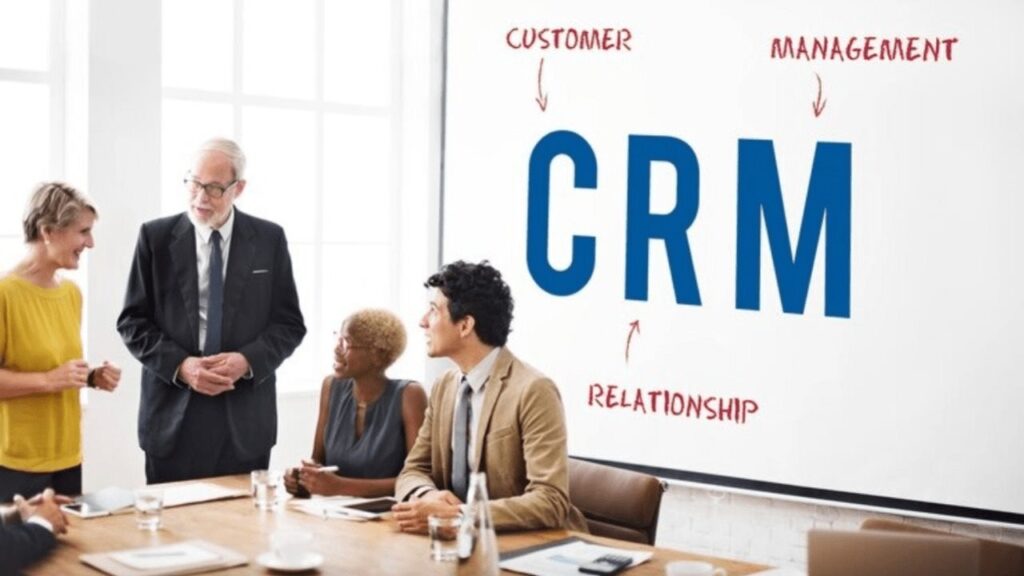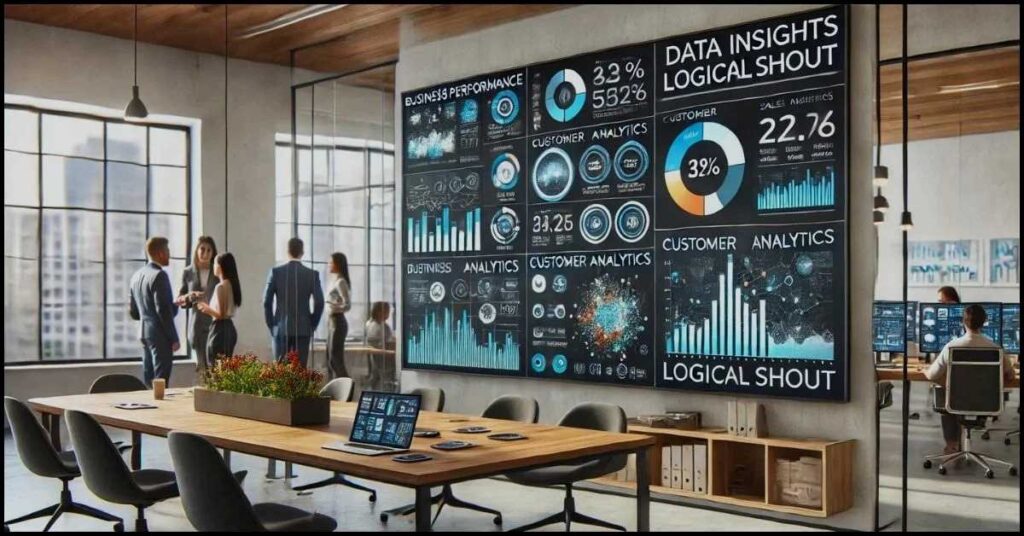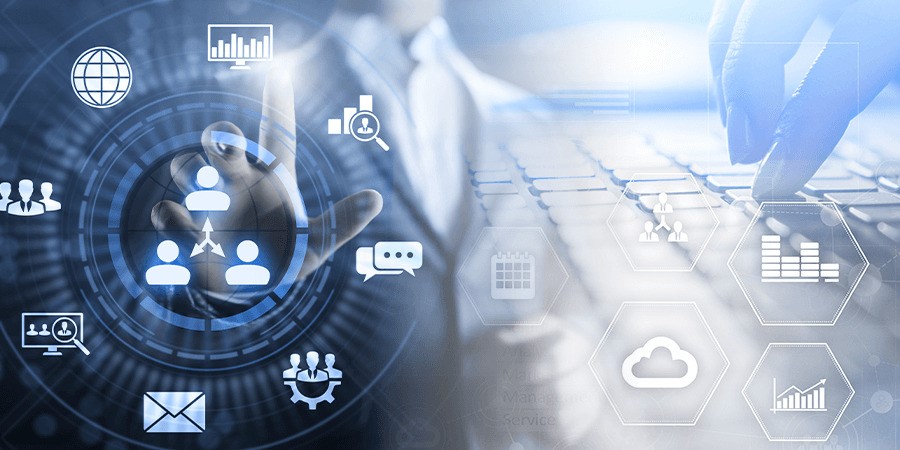If you are thinking about using a CRM system or want to improve the one you already have, you are in the perfect spot.
A Customer Relationship Management (CRM) system is a type of software that helps businesses keep track of their interactions with customers—both current and potential ones.
This guide will help you understand the key things to think about when choosing a CRM. We will talk about how different systems fit various industries, the role of AI in these tools, and the challenges of getting everyone on board.
Understanding CRM – Key Features and Functions:
A CRM, or Customer Relationship Management system, is all about helping businesses keep track of their customer information and interactions. It makes communication between businesses and customers easier.

Here is a simple breakdown of what a CRM can do:
- Customer Data Management: Think of it as a digital filing cabinet where all customer information is stored in one place.
- Sales and Lead Tracking: CRMs help businesses see how potential customers move through the sales process, making it easier to manage leads.
- Task Automation: It can take care of routine tasks, like sending emails or setting reminders, so everyone can focus on more important things.
- Analytics and Reporting: CRMs provide reports that give valuable insights into how sales are doing and what customers want.
- Collaboration Tools: Many CRMs come with features that help team members work together and communicate better across different departments.
Every business is unique, so it is essential to choose a CRM that fits specific needs and goals. By doing this, companies can enhance their customer relationships and drive success.
Industry-Specific CRMs – Custom Solutions for Your Unique Needs:
Every industry has its own set of challenges, and that is where industry-specific CRMs come in.
Here is a look at how these CRMs cater to different sectors:
- Retail: For retail businesses, CRMs help manage things like inventory, sales records, and customer loyalty programs, making it easier to keep track of everything.
- Healthcare: In healthcare, CRMs are designed to meet regulations like HIPAA while also improving communication with patients, ensuring they get the care they need.
- Real Estate: Real estate CRMs make it simpler to handle property listings, keep track of buyer interactions, and manage all the necessary paperwork.
Choosing a CRM tailored to your industry can be a game-changer. It offers features that fit your specific needs, helping you run your business more smoothly and efficiently!
Read Also: Kase Abushark
CRM Integrations – Making Work Easier with Other Tools:
One of the best things about using a CRM (Customer Relationship Management) system is how easily it connects with other business tools. This connection helps make our work smoother and less stressful.
For example, when a CRM links up with an ERP (Enterprise Resource Planning) system, it allows us to keep customer info in sync with things like inventory and financial records.

Imagine how much easier it is to run targeted email campaigns when our CRM connects with our email marketing tools! We can set up personalized messages and even automate follow-ups, saving us a ton of time.
When we link our CRM with customer support platforms, it becomes so much simpler to handle customer questions. This way, our support team can respond faster and more effectively.
Plus, by tracking customer interactions on social media sites like Facebook and Twitter, we gain insights into what our customers really want.
In short, bringing all these tools together does not just make managing customers better; it also helps us work more efficiently and reduce those annoying bottlenecks in our operations.
AI and Machine Learning in CRM – Changing How We Understand Customers:
Artificial intelligence (AI) and machine learning (ML) are really shaking things up in customer relationship management (CRM) systems. They help businesses get a better grip on what customers want and make everyday tasks easier.
One cool thing is predictive analytics. This means AI looks at past data to guess what customers might do next, like if they are likely to make a purchase.
AI chatbots are also a big deal in customer service. They handle simple questions quickly, which means faster responses for everyone. Plus, AI can help with lead scoring, which is just a fancy way of saying it helps businesses figure out which potential customers are most interested in buying.
Overall, using AI and ML in CRM gives companies deeper insights, helping them make smarter choices and build stronger relationships with their customers. It is all about using data to connect with people better!
Read Also: Pondershort.com
Measuring Customer Feedback and Satisfaction:
Customer Relationship Management (CRM) systems play a key role in gathering and understanding customer feedback. They help businesses see how happy their customers are by using tools like surveys, Net Promoter Scores (NPS), and online review monitoring.

For example, after a customer has an interaction, businesses can automatically send them a survey to find out how they did. By keeping track of NPS scores, companies can see how customer loyalty and satisfaction change over time.
Plus, CRMs help businesses monitor online reviews, which allows them to quickly address any problems that pop up. This kind of feedback is incredibly useful for improving products, services, and processes, ultimately leading to happier, more loyal customers.
Cloud vs. On-Premise CRMs – A Detailed Comparison:
Choosing between cloud-based and on-premise CRMs is an important choice for any business, and each option has its own perks and downsides:
- Cloud CRMs: These are managed on the provider’s servers, which means you can access them from anywhere. They are great for businesses that want flexibility, as they typically cost less upfront and require less maintenance.
- On-Premise CRMs: These are installed on your company’s own servers, giving you more control and better data security. However, they can be more expensive to maintain and might not scale as easily as cloud options.
When it comes to making this choice, businesses should think about their budget, how much they value security, and their plans for growth in the future. It is all about finding what fits best with your goals!
Mobile CRM – Boosting Productivity While You’re On the Move:
With remote work becoming more common and technology advancing, mobile CRMs have become vital for businesses today. A mobile CRM lets sales teams and remote workers check customer information in real-time, making it simpler to close deals and stay on top of tasks.

Here is how mobile CRMs can really help businesses:
Access Anytime, Anywhere: Team members can look up the latest customer info from any place they are.
Easier Task Management: Mobile CRMs come with handy tools for managing tasks, setting reminders, and keeping track of what needs to be done.
Support for Field Sales: Sales teams working out in the field can update information instantly, which means less waiting around for data to be entered and better service for customers.
In short, mobile CRMs help teams work better by giving them the tools they need, no matter where they are!
Read Also: 127.0.0.1:62893
Overcoming Challenges with User Adoption and Training:
When businesses start using new CRM systems, one of the biggest challenges is getting everyone on board. Change can be hard, especially if the new system feels complicated.
To make things easier, it is important to hold training sessions that help everyone feel comfortable with the system. Picking a CRM that has a simple and friendly design can also make learning smoother.
Plus, getting teams involved early in the selection process helps them feel connected and more invested, which can lead to a smoother transition. Having a good onboarding and training plan is key to ensuring that everyone feels confident and ready to use the new system.
Understanding the Cost and Benefits of CRM Systems:
Setting up a CRM (Customer Relationship Management) system can be really helpful for a business, but it is important to understand how much it will really cost and what benefits you might get in return.
There are several things that can affect the overall cost. For example, you might need to customize the CRM to fit your specific needs, which can add to the expenses. Plus, you will need ongoing support and maintenance to keep everything running smoothly, and that can also raise the total cost.

Training your team on how to use the new system is another important step, and it will contribute to those initial costs, too.
To figure out if it is worth it, businesses should look at how much they improve in sales, efficiency, and customer loyalty compared to what they have spent. In short, it is about balancing what you invest with the rewards you gain!
Real-World Examples – CRM Success Stories:
Successful CRM implementations can lead to significant business improvements. For example:
- Case Study 1: A retail business saw a 30% increase in customer retention by using AI-powered lead scoring.
- Case Study 2: A healthcare company improved patient engagement by automating appointment reminders and feedback collection.
These examples demonstrate how a well-chosen CRM system can transform business operations and customer relationships.
Read Also: VandyWorks
FAQs about CRM systems:
Who can benefit from using a CRM?
Any business, from small startups to large enterprises, can benefit from CRM systems. They help manage customer interactions, improve sales, and enhance customer service across various industries like retail, healthcare, and finance.
What challenges arise during CRM implementation?
Common challenges include data migration issues, user adoption resistance, and integration difficulties with existing systems. Proper training and user-friendly solutions can help overcome these hurdles.
How do CRMs improve customer retention?
CRMs enhance customer retention by analyzing customer behavior and feedback, enabling personalized communication and improved service, which fosters stronger relationships.
Why is data security important in CRM selection?
Data security is critical because CRMs handle sensitive customer information. Businesses should choose CRMs that comply with data protection regulations and have robust security measures in place.
What costs are involved with CRM systems?
Costs vary based on subscription fees, customization, implementation, and ongoing maintenance. Understanding the total cost of ownership (TCO) is essential for informed decision-making.
Conclusion – Picking the Right CRM for Your Business:
Choosing the right CRM system is a big decision that can really affect how you connect with your customers and run your business. To find the best fit, think about things like how much you might grow, how it can work with other tools you already use, its AI features, and any special needs for your industry.
Read Also:
